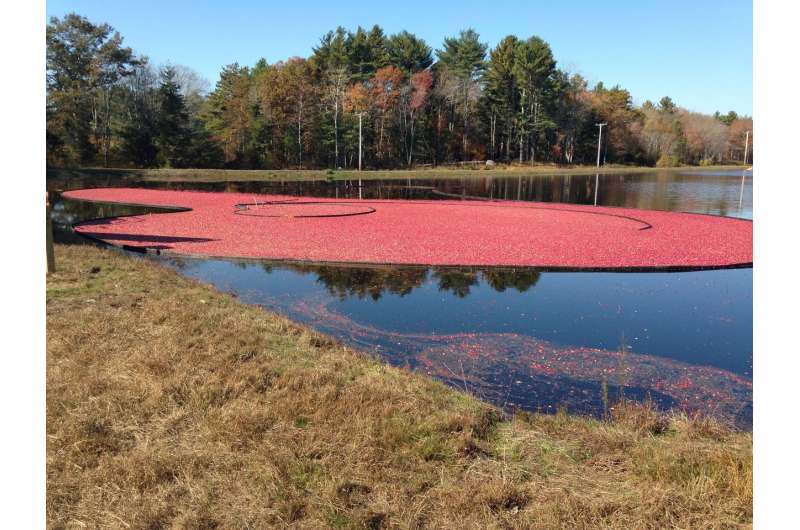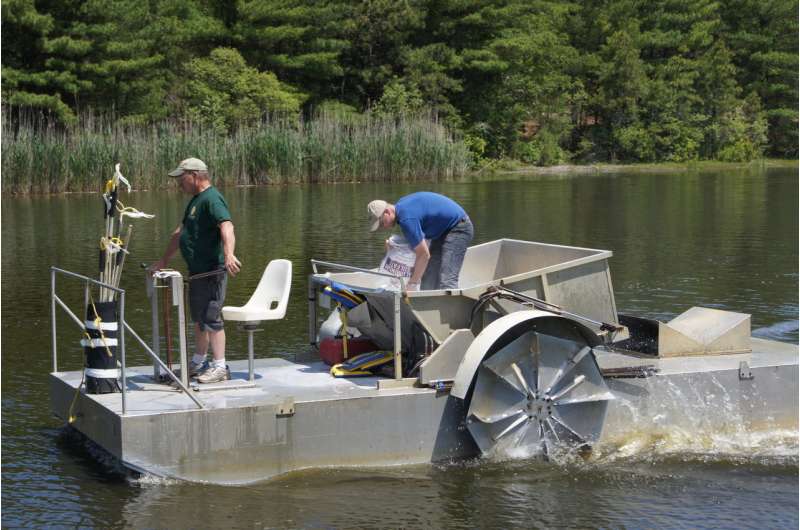Cranberry growers tart on phosphorus

At Thanksgiving, many Americans look forward to eating roast turkey, pumpkin pie, and tangy red cranberries. To feed that appetite, cranberry farming is big business. In Massachusetts, cranberries are the most valuable food crop. The commonwealth's growers provides one-fourth of the U.S. cranberry supply.
Water plays a big role in cranberry farming. At harvest time, cranberry growers flood their fields (cranberry bogs) so the berries will float for easy gathering. The growers may also flood their fields to protect the plants from frost in the winter.
All this water presents a problem to cranberry producers. Phosphorus leaves the cranberry farm when water drains from the flooded fields. Cranberry farms have been identified as a source of excess phosphorus in some Massachusetts lakes. Since cranberry growers depend on continued access to good quality water for their operations, they need to find ways to limit the movement of phosphorus off of their farms.
Phosphorus is an important nutrient that is often added to cranberry fields as a fertilizer. It is also naturally present in watery ecosystems. But too much causes algae to grow faster than ecosystems can handle. These large growths of algae, called algal blooms, can severely reduce or eliminate oxygen in the water. This leads to illness and death for large numbers of fish.
These concerns led a team of Massachusetts-based researchers to study ways to reduce the amount of phosphorus leaving cranberry farms. The study was conducted by Casey Kennedy of the U.S. Department of Agriculture - Agricultural Research Service and colleagues at USDA-ARS and the University of Massachusetts.

The researchers added five chemical compounds, or salts, to surface water used for cranberry production. These salts were chosen because they were already known to be good at trapping phosphorus. In addition to applying the salts to water samples in the lab, the researchers also applied salts directly to ponds connected to cranberry bogs using a sand barge. This is a process that cranberry farmers could also use on their ponds.
"One of our goals was to help growers manage phosphorus loss on their own," Kennedy said. "So the study was conducted using methods that could easily be used by growers."
The researchers concluded aluminum sulfate seemed to be the best salt suited to the task. Aluminum sulfate was effective in reducing phosphorus by 78-93% when applied at a concentration that is cost-effective for farmers to use.
When adding a new substance to an ecosystem, however, it is important to be aware of unintended, harmful effects. Kennedy noted, "The cranberry is a wetland plant that is naturally adapted to relatively high concentrations of aluminum in soils. So it may be possible to apply aluminum sulfate directly to bogs without negatively affecting cranberry production. Until then, we have demonstrated that this technique can be used to trap phosphorus in holding ponds, resulting in cleaner water for release downstream."
More research is needed to better understand the way aluminum transfers from soil to water to plants. If all goes well, we can continue to be thankful for a preserved environment??as well as cranberries for our feast??for many years to come.
More information: Casey D. Kennedy et al, Managing Surface Water Inputs to Reduce Phosphorus Loss from Cranberry Farms, Journal of Environment Quality (2017). DOI: 10.2134/jeq2017.04.0134
Provided by American Society of Agronomy
















